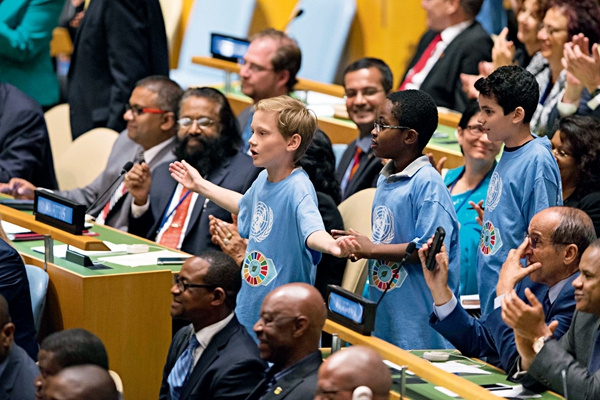U.S. departure from Paris Agreement cannot stop low-carbon trend
- By Li Ruixin
 0 Comment(s)
0 Comment(s) Print
Print E-mail China Today, July 18, 2017
E-mail China Today, July 18, 2017
Domestic and global influence
Domestically exiting the Paris Agreement will slow down the progress of greenhouse gas reduction. Trump denounced climate change as a "hoax" during the presidential campaign. After taking office, he appointed Scott Pruitt, a climate change skeptic, chief of the Environment Protection Agency (EPA). President Trump slashed the budget of the EPA and signed an administrative order for "energy independence."
Trump plans to fuel the American economy by revitalizing the traditional fossil energy industry. The facts prove, however, that he will not get his way. In 2014, the White House issued an evaluation pointing out that climate change as a result of human activities had greatly affected the U.S. – the country faces rising sea levels and more frequent storms and floods in the north, and severe water shortage in the south. In 2012 alone, incidents related to climate change caused a loss as high as US $100 billion. An overdependence on fossil fuels is estimated to bring larger economic losses to the country, instead of a so-called economic revival.
|
|
|
Children representing the 197 nations who have signed the Paris Agreement celebrate at the signing ceremony on April 22, 2016. [File photo] |
Furthermore, according to the EPA, the clean energy projects that have been deferred, revised or discarded by the Trump administration, if carried out as planned, would avoid 3,600 cases of premature deaths caused by air pollution every year. From the perspective of health, Trump's ongoing fuel plan will not "Make America Great Again."
The U.S. slowing down of the reduction of domestic emissions will exert a negative influence on the implementation of the Paris Agreement globally. After assessing the INDCs of all countries, the UN has found that, even if each party strictly meets its commitment, there is some way to go before the target of keeping a global temperature rise to under 2 degrees centigrade can be reached. Closing the gap is one of the key issues for the reviewing mechanism, according to the Paris Agreement. The U.S.'s reneging on its commitment will directly erode the strength of global climate actions.
As the U.S. federal government will have no substantial deeds in global climate governance for the next four years, the funds it has committed to developing countries are not anticipated to arrive. This could affect the political will of some "swing" countries in combating climate change, and also lessen the capacity of the least developed countries to cope with threats from climate change disasters.
China takes a firm stance
Without the backing of the U.S., other countries, including China, will struggle to realize the climate change target. However, the trend of sustainable development is irreversible. The world will turn to China to lead the action on global climate change. Following Trump's withdrawal decision, China reiterated its firm stance to continuously ramp up efforts to tackle climate change and meet the commitment of the Paris Agreement.
In its 13th Five-Year Plan drawn up in 2016, China proposed to control its total energy consumption to within 5 billion tons of standard coal by 2020, and slash energy consumption per unit of GDP and carbon emissions on the basis of 2015, representing a clear target for China's low-carbon development and energy transformation. China has emerged as a leader in global climate governance. It has engaged in South-South cooperation in climate change since 2011, helping other developing countries to promote their capacities and confidence in this regard. The Chinese government has since earmarked an accumulative RMB 580 million for developing countries. In 2015, it pledged RMB 20 billion to set up a South-South cooperation fund on climate change.
At the Belt and Road Forum for International Cooperation held in Beijing in May, China declared that it would expand the scale of the Silk Road Fund and South-South Cooperation Fund, and also proposed to establish the International Coalition for Green Development on the Belt and Road. The Belt and Road Initiative will, under the "green" principle, advance cooperation in energy utilization, environmental protection, and coping with climate change as well as enhancing the infrastructure and economic development.
A developing country itself, China's role in the fight against climate change is one of great significance to other developing countries. By facilitating cooperation under frameworks such as the Belt and Road and South-South cooperation, China could encourage the business and private sectors to promote experience and technologies in sustainable development to help other developing counties. China could take positive actions to show its resolution in this regard, so as to advance the multilateral process of global climate governance, promote policy transparency, and along with other countries, jointly confront the global challenge of climate change.
(Li Ruixin is program officer at Greenovation Hub, a Chinese NGO on climate and environment governance.)







Go to Forum >>0 Comment(s)